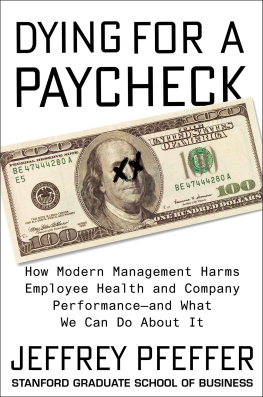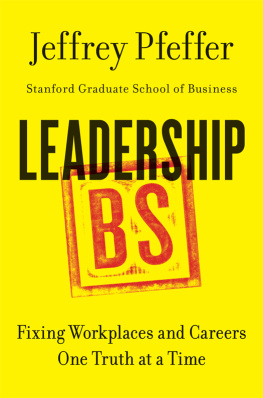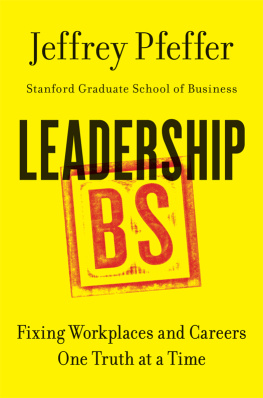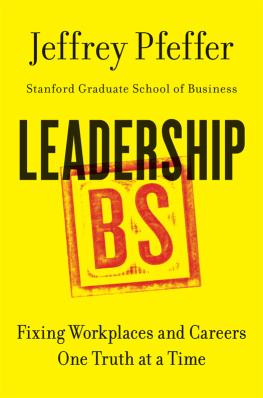Be Prepared for Power
A LMOST ANYTHING is possible in attaining positions of power. You can get yourself into a high-power position even under the most unlikely circumstances if you have the requisite skill. Consider the case of a real person well call Anne. Coming out of business school, Anne wanted to lead a high technology start-up. But Anne had no technology background. She was an accountant and had neither studied nor worked in the high-tech sector. Not only that, prior to her business education she had practiced public-sector accountingshe had been a senior accountant working in an important agency in a small foreign country and she was now focusing her aspirations on Silicon Valley in California. Nonetheless, Anne was able to accomplish her goal by making some very smart power plays.
Success began with preparation. While most of her compatriots took the entrepreneurial classes offered in the business school, Anne took a class in the engineering school on starting new ventures. With that one move she altered the power dynamics and her bargaining leverage. In the business school class, there were about three MBAs for every engineer, while in the engineering school course, there was only about one MBA for every four engineers. She explained that MBAs were unwilling to walk all the way over to the engineering building. Not only did she want to improve her bargaining position, Anne wanted to take a class closer to the laboratories, where technology was being developed and where she was more likely to run into interesting opportunities. Because of the pressure from the professor and the venture capitalists who judged the business plans that were the central part of the course to get MBA skills reflected in that work, Anne had bargaining leverage in her chosen environment.
After interviewing a number of project teams, Anne joined a group that was working on a software product that improved existing software performance without requiring lots of capital investment in new hardware. She had not developed the technology, of course, and joined the team notwithstanding some disdain for her skills on the part of her engineering colleagues.
Having found a spot, Anne was then very patient and let the others on her team come to recognize her value to them. The teamshe was the only womaninitially wanted to target the product at a relatively small market that already had three dominant players. Anne showed them data indicating this was not a good idea, but went along with the groups wishes to focus on this first market in their class presentation. The presentation got creamed by the venture capitalists. As a result, the engineers began to think that Anne might know something of actual value. When the course was over, the team continued to work on their idea and got a small seed grant from a venture capital firm to develop the business over the summer. Anne, the best writer on the team, took the lead in putting together the funding pitch.
Anne was graduating with an offer from a major consulting firm. She told her team about the offer, thus letting them know she had much higher paid options so they would appreciate her and realize that she could make a credible threat to quit. She also intentionally let the engineers try to do things that she knew how to do proficientlysuch as making presentations and doing financial projectionsso they could see these tasks werent as easy as they thought. Anne used her accounting and business expertise to review the articles of incorporation for the new company and the funding documents for its financing. Meanwhile, she gathered lots of external information and, being more social than the engineers, built a strong external network in the industry they were set to target. Her outside contacts helped the team get funding after the summer was over and the initial seed grant had run out.
Anne had more than business skillsshe was also politically savvy and tough. When classes were over and the team was setting up the company, there was one other competitor for the CEO position. Anne told her colleagues she wouldnt join the company if he was named CEO. To show she was serious and to gain further leverage, she had her colleagues meet with other MBAs who might be possible replacements for her. Because she had spent lots of time working with the team, eating lots of pizza and bad Mexican food, the group felt much more comfortable with Anne. In the end she became co-CEO and found funding for the product at a hedge fund. Although there is no guarantee the business or product will be successful, Anne achieved her goal of becoming the leader of a promising high-tech start-up less than a year after graduating from business school, overcoming some significant initial resistance and deficits in her background along the way.
In contrast to Anne, you may have lots of job-relevant talent and interpersonal skills but nevertheless wind up in a position with little power, because you are unwilling or unable to play the power game. Beth graduated from a very high status undergraduate institution and an equally prestigious business school about 20 years ago. When I caught up with her she had just left the nonprofit she was working for after a new executive director took over. The new boss was a friend of several of the nonprofits board members and had once worked with Beth. He saw her competence as a threat and was willing to pay her a decent severance to get her out of the way.
Beth has experienced a nonlinear career after her MBA, punctuated by several spells of unemployment as well as some periods of great job satisfaction. She has yet to attain a stable leadership position in her chosen field, even though she has held senior jobs in governmenton Capitol Hill and in the White House. The issue, as she explained it to me, was her unwillingness to play organizational politics, or at least to do so with the consistent focus and energy and maybe even the relentlessness evidenced in Annes story. Jeffrey, its a tough world out there, Beth said. People take credit for the work of others. People mostly look out for their own careers, often at the expense of the place where they work. The self-promoters get rewarded. Nobody told me that my coworkers would come to the office each day with a driving agenda to protect and then expand their turf. I guess I havent been willing to be mean enough or calculating enough or to sacrifice things I believed in order to be successful, at least as success is often measured.
Systematic empirical research confirms what these two contrasting stories, as well as common sense and everyday experience, suggest: being politically savvy and seeking power are related to career success and even to managerial performance. For instance, one study investigated the primary motivations of managers and their professional success. One group of managers were primarily motivated by a need for affiliationthey were more interested in being liked than getting things done. A second group were primarily motivated by a need for achievementgoal attainment for themselves. And a third group were primarily interested in power. The evidence showed
So welcome to the real worldnot necessarily the world we want, but the world that exists. It can be a tough world out there and building and using power are useful organizational survival skills. There is a lot of zero-sum competition for status and jobs. Most organizations have only one CEO, there is only one managing partner in professional services firms, only one school superintendent in each district, only one prime minister or president at a timeyou get the picture. With more well-qualified people competing for each step on the organizational ladder all the time, rivalry is intense and only getting more so as there are fewer and fewer management positions.











